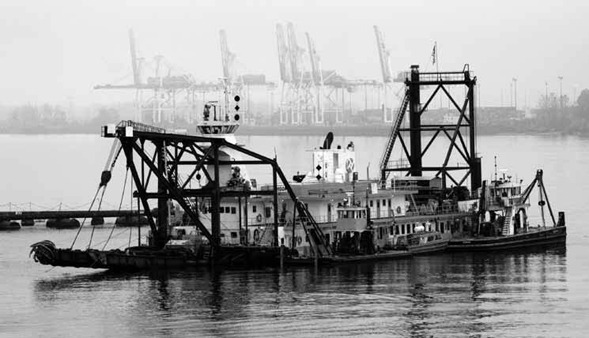The Port of Portland is busy on many fronts trying to avoid and reduce environmental impacts from our operations. In addition to day-today attention to responsible environmental management, we’ve set a series of objectives and targets to help guide our efforts over our fiscal year. Here is a highlight of what we’ll be working on this year; a complete list is available at www.portofportland.com.

The Dredge Oregon is slated for an engine replacement, which will reduce emissions from and improve fuel efficiency of the mid-1950s vessel.
Minimize Impacts to Air Quality
Efforts to reduce Port direct and indirect greenhouse gas emissions and diesel particulate matter from Port-controlled operations continue over the next year. We’ll focus on renewable energy and on funding a repower of the Dredge Oregon. We estimate that by repowering the dredge, we can reduce annual fuel consumption by approximately 250,000 gallons and off-road emissions by 26 percent. This project recently received a grant from ConnectOregon III, a state program that invests in non-highway transportation infrastructure.
Reduce Energy Consumption and Purchase Renewable Energy
Just a few months into the fiscal year, our ambitious target is complete: this year we will move to certified renewable energy for 100 percent of the Port’s electric energy. This commitment landed us on the Environmental Protection Agency’s Top 50 list of renewable energy purchasers.
Reduce Waste Generation and Hazardous Materials Use
The Port’s adherence to the three Rs – reduce, reuse, recycle – has helped to shrink the amount of trash we send to the landfill. There’s always room for improvement, however, and our goal is to continue focusing on reduction. One new way we’re doing this is through new copy machines at the Port headquarters that use solid ink technology: no plastic cartridges, with all materials fully recyclable.
Minimize Impacts to Water Resources
Water conservation efforts continue at the Port, with targets dedicated to retrofitting another 162 toilets with dual-flush, low-flow valves and to installing four Evapotranspiration Managers in Port landscaping. These systems use real-time weather data to manage irrigation systems, shrinking unnecessary water use.
Minimize Impacts and Seek Opportunities to Enhance Natural Resources
This next year, the Port’s natural resources targets are dedicated to trees, turtles and teeny critters— macroinvertebrates, that is. In addition to a Friends of Trees planting and a multi-agency study of native turtles, the Port will open properties to the Xerces Society for an evaluation of habitat function provided by created versus natural wetlands and how that affects macroinvertebrate communities like snails, clams and aquatic worms.
